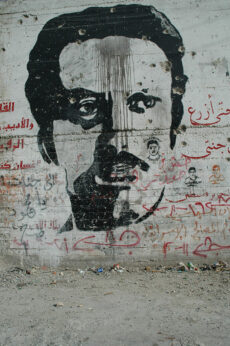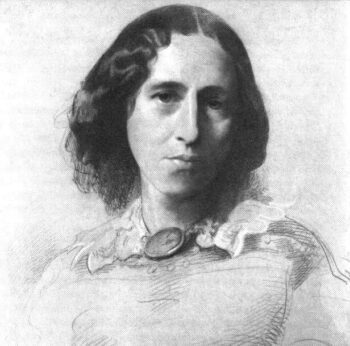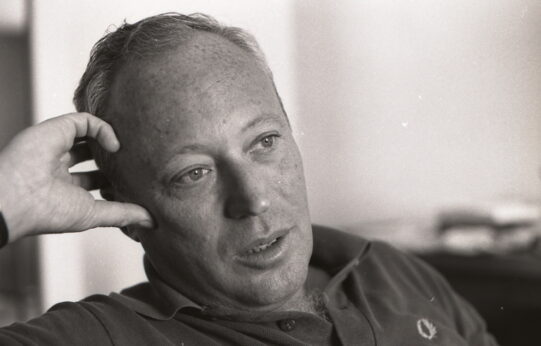
On a summer day in Beirut in 1972, a Palestinian man and his 17-year-old niece walked from their home to their car. He turned the key in the ignition, detonating a grenade, which triggered a plastic bomb placed under the back bumper, killing them both. The man was one of the hundreds of thousands of Palestinians able to flee the Nakba of 1948, the name given to the mass displacement of Palestinians in the aftermath of the creation of Israel, only to be assassinated decades later by Israel’s secret police, Mossad.
The Palestinian man, Ghassan Kanafani, was not a military general or soldier, but a writer. His weapon was not an assault rifle, which his hands had never fired, but a pen and a typewriter. Kanafani’s wife said that in the aftermath of his death, his fingers, formerly strained from countless hours of typing, were strewn in the leaves of a nearby tree. In an obituary, a journalist friend of his wrote that Kanafani’s pen “hurt the enemy more than a column of commandos.”

With Israel’s latest Nakba displacing millions and killing tens of thousands of Palestinians in Gaza and the West Bank, Kanafani’s revolutionary works have found a new life in the West. Although few English editions of his books exist—his short story collections published in English in the late 1990s, Men in the Sun and Palestine’s Children, were, until 2022, all that one could find readily online—his 1967 book, On Zionist Literature, was translated and published in English for the first time in 2022. There is something profound and vitalizing in his writing; it is the same quality that motivated his assassins half a century ago that captivates and inspires new readers today. Those interested in the origins of political Zionism and its deviations from the religion of Judaism will find insights in his freshly translated book.
Proto-Zionism against ‘the Yid’
Zionism as we know it today is the culmination of a decades-long campaign by a reactionary minority of the European Jewish population against integration with European cultures. In 1897, the First Zionist Conference adopted the Basel Program, which called for a retreat of the Jewish population from Europe, aiming instead to establish “for the Jewish people a publicly and legally assured home in Palestine.” It took half a century for the Zionist project, once ridiculed as preposterous and unthinkable, to become a material reality with the 1948 creation of Israel.
Many political elements contributed to Israel’s rise and the oppression of Palestinians, but instrumental among them was the role of literature. Ghassan Kanafani’s On Zionist Literature traces the early origins of reactionary factions of Jewish European thinkers who rejected integration into European cultures on account of perceived racial-religious superiority. This superiority complex maintained that centuries of wandering and weathering deadly anti-Semitic violence strengthened the pure “Hebrew” bloodline, supplying it with heroic traits and a culture that should remain unmuddied by European society.
As Kanafani tracks throughout the book, that doctrine manifested itself forcefully in literature. “I became a Hebrew because I hated the Yid,” says Joseph, the hero of the 1945 Zionist novel Thieves in the Night. Here, a clear line is drawn between the Zionist, in this case the “Hebrew” or ideal Jew, and the corrupted Jewish European “Yid.” This sentiment echoed the Zionist rejection of mixing Hebrew with European languages, specifically shaming Jews who spoke Yiddish, the language spoken by Eastern European Jews that mixed Hebrew and Slavic words into a basically German language. (Kanafani points to the case of Moses Mendelssohn’s German translation of the Jewish Bible in the 18th century that “failed [to help assimilate] due to a ferocious campaign by racists who refused to be regarded as equal to other peoples.”)
Zionism effectively politicized the Hebrew language. Its adherents distorted purely religious texts—the poems of Yehuda Halevi, for example, who wrote psalms for the synagogue in the 12th century that included lines about journeying to Zion—into rallying cries for a religious state to seize land from Palestinians. Menachem Ribalow, an American Jewish immigrant writer, underscored the importance of literature to the spread of right-wing Zionist ideology, writing that Palestine “lived in the heart of the Jew through poetic imagery… this is what was present in the Psalms, and what became the Jew’s daily bread.” By the mid-20th century, Hebrew no longer acted solely as a sacred religious language of the past. It was a key political tool for building a future Jewish nation.
Inspiring political Zionism
 “We are the chosen people… Thou knowest the records of our holy race.”
“We are the chosen people… Thou knowest the records of our holy race.”
“Yes, I know them: like all records, annals of blood.”
“Annals of victory, that will dawn again.”
These words are from the sixth novel of not-yet-British-Prime-Minister Benjamin Disraeli, The Wondrous Tale of Alroy, telling the adventures of a fictional Jewish hero, David Alroy. Originally published in 1833, the novel is a romantic saga, casting a Jewish character as the courageous protagonist. Permeating beneath the heroic perils of Alroy, however, is the notion of religious and racial supremacy—proverbs about the “blood of David” and “the sacred offspring of a solemn race” line the pages of the rambling novel. It’s credited as the first proto-Zionist text in Western literature.

In 1848, the English novelist George Eliot, not Jewish herself, felt that Disraeli was too explicit with his charged views of racial purity professed by the character Sidonia. Her literary answer was the 1876 novel, Daniel Deronda. The two main plots throughout the lengthy Victorian story follow Gwendolen Harleth and then Danial Deronda; the first was praised by critics and the latter was considered flat and boring, but not to the Zionists whom it inspired. In the novel, Eliot made the explicit call for a “Jewish…republic,” advocating for the conquering of Palestine so that “the outraged Jew shall have a defense in the court of nations, as the outraged Englishman of America.” If The Wondrous Tale of Alroy introduced the Zionist hero to English literature, Eliot’s novel established him as a genre.
“Within four years of [Daniel Deronda’s] publication,” Kanafani wrote, “a new school of theorists in Russia—Peretz, Gordon, Smolensky, and Lilienblum—changed its position on social integration by adopting ‘national-political restoration’ as a resolution to the Jewish question.” The book calling for the “[Jewish] race” to take on “the character of a nationality” was translated into Hebrew and became “a Zionist Bible” for Jewish readers across the world. In 1948, the year of the Nakba, Israel named a road in Tel Aviv after George Eliot.
Theodor Herzl, considered the father of political Zionism, took things a step further. In 1902, Herzl published the utopian Zionist novel, The Old New Land. Replacing the fictional Jewish heroes of earlier works, Herzl shows a propagandistic future Palestine where European Jews transform Palestine into a cosmopolitan wonderland. These literary manifestations of a reactionary segment of the European Jewish population went on to build a real political movement based on these notions of racial supremacy and imperialist ambitions.
A Zionist James Bond
In the 1940s, Nazis and their collaborators systematically slaughtered six million European Jews under the conspiracy of racial supremacy and anti-Semitic conspiracies. The Holocaust only reinforced what Zionists had been saying for decades, namely that equality was impossible for European Jews, and therefore they should gather to safety under the flag of one Jewish nation. In 1948, built on the political foundations of Zionist lobbying in the preceding decades (notably the 1917 Balfour Declaration), Western countries gave the green light for Jewish refugees and diaspora to displace the Palestinians who’d lived there for centuries.
Books like Leon Uris’ Exodus and Arthur Koestler’s Thieves in the Night were used to shift the narrative of the creation of Israel from an invading force—Jewish refugees from Europe transferring their anger against Nazis in Germany to Palestinians who had nothing to do with the Holocaust—to reformers, bringing “civilization” to a “backwards” people—the traditional justifications of colonial conquests.

In Exodus, the author paints the native Arab population as inferior opportunists. Uris wrote, “If the Arabs of Palestine loved their land, they could not have been forced from it—much less run from it without real cause. The Arabs had little to live for, much less to fight for. This is not the reaction of a man who loves his land.”
This notion is echoed in Thieves in the Night, which claims that Arabs “haven’t [produced] anything worth showing off, except cabarets and filthy postcards, from Tangier to Teheran—not for the last thousand years.” (The Persians of Teheran would surely bristle at being subsumed into the Arab world.)
An Arab character in Exodus says that “the Jews are the only salvation for the Arab people. The Jews are the only ones in a thousand years who have brought light to this part of the world.” Even the Israeli journalist and human rights advocate Amnon Kapeliouk admits that “after all [Israelis] say and do, we look at [the Arabs] from above and don’t take them seriously. We feel superior to them and it is hard to imagine that this feeling will disappear one day.”
Jewish characters and soldiers, however, are praised in these novels as being “the most highly educated and intellectual as well as idealistic body of men under arms in the entire world.” An English officer says “The Hebrew warrior is the finest, for he fights and lives close to ideals. This land is real to him. He lives with great glories all around him.”
Exodus and other novels presented Zionist propaganda not only to Jewish populations but also to a non-Jewish audience in the U.S. and Western Europe, presenting a distorted historical narrative for remorseful non-Jewish peoples after the Holocaust. “Uris put sex, success, and ‘James Bondism’ into Zionism,” Kanafani wrote. Then-Prime Minister of Israel David Ben-Gurion praised Exodus saying, “As a piece of propaganda, it’s the greatest thing ever written about Israel.”
De-normalizing Zionism
The English historian Arnold Toynbee understood the “Jewish demand, after all of their suffering they have endured at the hand of the Germans, to be given authority in a certain place in the world to exercise their own sovereignty.” But he countered that it “would have to come at the expense of the West, which carried out the cruelest horrors against the Jews, and not against the Arabs.” Toynbee thought this was an easy conclusion: Why would the genocide carried out by fascists throughout Europe be pinned on the Arab population in the Middle East? Yet whenever he mentioned this opinion, “it was met with cries of laughter.”
The right-wing Zionist position had become so effective, their propaganda so prominent, that the suggestion of establishing equality for European Jews or a nation within Europe was waved off as a joke. It was preferable to displace and kill Arab Muslims thousands of miles away while restoring Nazis to high positions in West Germany than to force any European countries to provide land and safety for their Jewish population. In his introduction to On Zionist Literature, Steven Salaita writes that “Zionism is neither a cultural inclination nor a political necessity. It is a material phenomenon rooted in chauvinistic ideas of culture and politics that tried to squash revolutionary and communist Jewish politics in Europe.”
While Kanafani’s book is focused on the ways that Zionist literature preempted, then justified the Zionist dispossession of Palestine, it is also a reminder that Zionism is only one political project within the global Jewish population. Jewish Americans, for example, were instrumental in building the labor movement, the Socialist Party, the American Labor Party, and the Communist Party. “Jewish-Americans had long been considered one the most progressive ethnic-religious groups,” wrote Daniel (Danny) Rubin, a leader in the Communist Party USA and the Party’s Jewish Commission, in his introduction to the book, Anti-Semitism and Zionism: Selected Marxist Writings. “But during the height of the Cold War with its virulent anti-Sovietism and anti-Communism, and later with a wave of Zionist national chauvinism connected to the early Israeli aggressive wars of expansion (1956, 1967, 1973), considerable numbers of Jews moved away from their progressive heritage.” (Rubin was called “The most dangerous man in America to American youth” by J. Edgar Hoover.)
There is something of the Kanafani in all of us that cannot accept oppression, nor abandonment of the desolate. And what will the future be? It is clear, as the Palestinian- and Jewish-led anti-war movement unfolded on campuses across the country, that many are challenging propaganda that has been, as Kanafani put it, “reverberating worldwide for over a half a century,” and through literature for longer than that.
Ghassan Kanafani
On Zionist Literature
Translated by Mahmoud Najib
Ebb Books, 2022
paperback, 188 pp.
ISBN: 1739985230
ISBN13: 9781739985233










